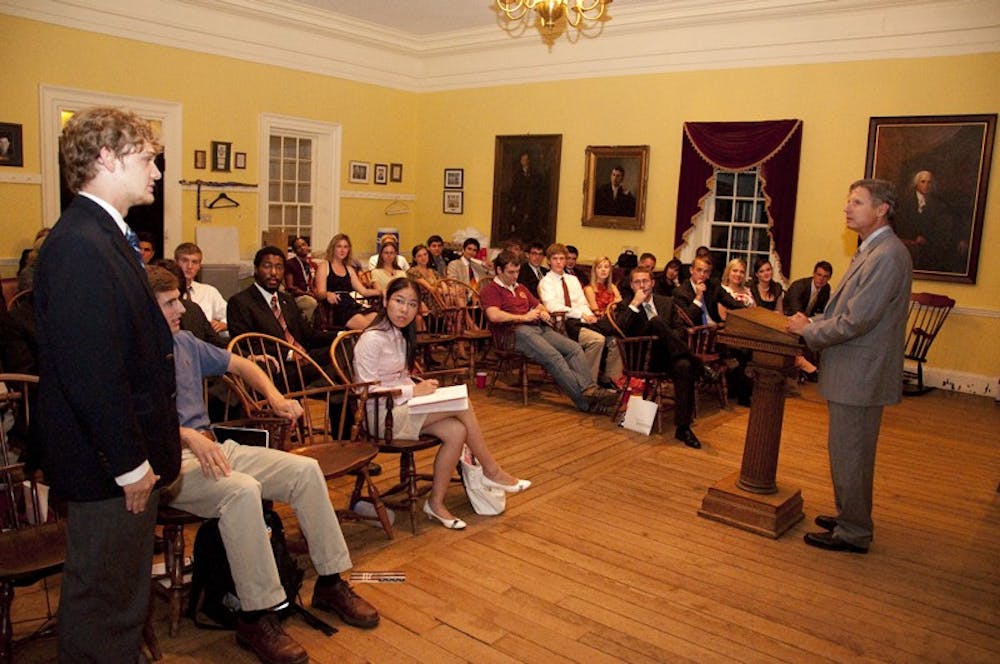Former New Mexico Gov. Gary Johnson spoke at Jefferson Hall Friday evening to discuss current national issues, including what he considers to be the erosion of civil liberties, the economy and drug policy.
A Republican governor elected in a largely Democratic state, Johnson, who came at the invitation of the Jefferson Literary and Debating Society, served from 1995-2003. During that time period, he also may have stood out in the national arena for vetoing 750 bills - more than any other governor at the time - to combat 'wasteful legislation.'
Introducing himself as a lifelong entrepreneur, Johnson further noted that his outspokenness about creating competition among educational institutions gave him a distinctive position in politics.
"I really believe that the notion of entrepreneurs is to deliver a better product, a better service at a lower price," he said. "I really believe that the government can provide opportunities for entrepreneurs to be able to do that. So I believe the only way to reform education is to bring competition to education and venture the way to do that."
Similarly, Johnson discussed his ideal role of the government - which should "slash spending and lower taxes" - in relation to the health care system. Rather than taking control of the system, Johnson argued that the government ought to reduce spending and ensure competition within the market.
"Like all industries, health care would benefit from a free-market approach providing the best product and services at the best price," he said.
Particularly in light of recent economic troubles, Johnson argued that the federal government must keep a tighter hold on its spending.
"The United States must live within its means," he said, adding that "multi-trillion dollar deficits" could harm the nation's security. "Government spending must be reduced to realistic levels and deliver fair value to the American taxpayer for every dollar spent."
In particular, Johnson identified the defense sector as an area that has seen excessive spending in recent years.
"We shouldn't be in Iraq, Afghanistan," he said, urging for a distinction between foreign aid and military alliance. "How can we afford to give any foreign aid when we are borrowing 43 cents of every dollar?" he said.
Johnson continued by stating that he supports sensible defense spending and believes that as a result of the economic crisis, the United States cannot afford to continue to maintain troops in almost 50 percent of the world.
It is not only imperative to take a conservative approach to spending, though, but also to improve the state of the government's coffers. Johnson argued that this could be accomplished through temporary guest worker programs for immigrants.
"We should make it easy to document workers through employers. Let immigrants pay taxes and help shoulder the social costs of their presence within this country," he said.\nJohnson's entrepreneurial philosophy also has pervaded his Our America Initiative, which advocates for civil liberties and favors the legalization and regulation of marijuana - treating it much in the same way as alcohol and tobacco. He contended that doing so would lead to a lower price for the product, advance health issues and eliminate the criminal element from its distribution.\nHe also argued that the government is doing more to take away citizens' individual liberties than to preserve them.\n"Many of our key protections under the Bill of Rights and the U.S. Constitution are gone," he said. These "loss of freedoms ... are now under attack from the very people charged with upholding them."\nSecond-year College student Jake MacMichael said he thought Johnson had a fresh perspective on often discussed issues. "He was voicing what a lot of people claim to be voicing," he said. "He had a very entrepreneurial sense of politics."\nJefferson Society Vice President Chris Mullen said the governor's speech touched on a variety of important topics relevant to national politics.\n"I felt that Governor Johnson's speech was highly engaging and relevant to the mindset that pervades throughout America today," he said.







